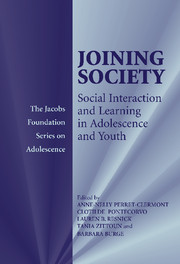Book contents
- Frontmatter
- Contents
- List of Contributors
- Foreword
- Preface
- I Introduction
- II Youth-Constructed Socialization
- III Personal Agency Through Collective Activity
- IV Learning in Practice and Discourse
- 11 From Learning Lessons to Living Knowledge: Instructional Discourse and Life Experiences of Youth in Complex Society
- 12 Practice and Discourse as the Intersection of Individual and Social in Human Development
- 13 Talking Matters: Studying the Use of Interdependencies of Individual and Collective Action in Youthful Learning
- 14 Young People's Use of Information and Communication Technologies: The Role of Sociocultural Abilities
- V Intergenerational Sites for Thinking
- VI Pathways to Adulthood in National Context
- Index
- References
14 - Young People's Use of Information and Communication Technologies: The Role of Sociocultural Abilities
Published online by Cambridge University Press: 08 January 2010
- Frontmatter
- Contents
- List of Contributors
- Foreword
- Preface
- I Introduction
- II Youth-Constructed Socialization
- III Personal Agency Through Collective Activity
- IV Learning in Practice and Discourse
- 11 From Learning Lessons to Living Knowledge: Instructional Discourse and Life Experiences of Youth in Complex Society
- 12 Practice and Discourse as the Intersection of Individual and Social in Human Development
- 13 Talking Matters: Studying the Use of Interdependencies of Individual and Collective Action in Youthful Learning
- 14 Young People's Use of Information and Communication Technologies: The Role of Sociocultural Abilities
- V Intergenerational Sites for Thinking
- VI Pathways to Adulthood in National Context
- Index
- References
Summary
Observing students building knowledge with digital media leads us to assert that some sociocognitive abilities that are trained within family life and more generally in social life can play an unexpected role in enabling youngsters to use media for accessing knowledge. Focusing attention on students' representations and behaviors when using media definitely shows that the usual vision of electronic tools always enforcing transmission of knowledge is nothing but a technician's illusion (Perriault, 1989; Pochon; Grossen, 1994). Our observations of young people using telecommunication and computer devices, including interactive videoconference equipment (Jaecklé & Perriault, 1998) and video games (Perriault, 1996), for entertainment or education show the prominent role of specific abilities that are hidden by the global notion of interactivity that is commonly used to describe such activities (Perret, 1996; Perriault, 1996, 1998). The abilities stressed here are both metacognitive abilities (Lowyck, Elen, Proost,; Buena, 1995) – namely, time management, parallel processing, and multilevel analysis of communication devices – and social abilities in collaborative study.
Sociocognitive Abilities
Time Management by Students
We have observed the use of telecommunications facilities that link students with teachers or experts at a distance through interactive videoconferences and Internet forums (Jaecklé Perriault, 1998). For interactive videoconferencing, a panel of experts, teachers, and students were gathered in a studio on the broadcasting site. The duration of the session was strictly fixed: one and a half hours. The broadcast was received on TV screens viewed by groups of tutors and students at universities.
- Type
- Chapter
- Information
- Joining SocietySocial Interaction and Learning in Adolescence and Youth, pp. 216 - 224Publisher: Cambridge University PressPrint publication year: 2003



